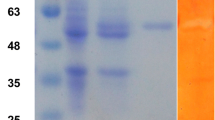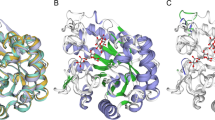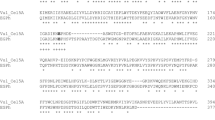Abstract
Culture-independent molecular-based approaches can be used to identify genes of interest from environmental sources that have desirable properties such as thermo activity. For this study, a putative thermo stable endoglucanase gene was identified from a mixed culture resulting from the inoculation of Brock-CMcellulose (1%) broth with mudspring water from Mt. Makiling, Laguna, Philippines that had been incubated at 90 °C. Genomic DNA was extracted from the cellulose-enriched mixed culture and endo1949 forward and reverse primers were used to amplify the endoglucanase gene, which was cloned into pCR-script plasmid vector. Blastn alignment of the sequenced insert revealed 99.69% similarity to the glycosyl hydrolase, sso1354 (CelA1; Q97YG7) from Saccharolobus solfataricus. The endoglucanase gene (GenBank accession number MK984682) was determined to be 1,021 nucleotide bases in length, corresponding to 333 amino acids with a molecular mass of ~ 37 kDa. The endoglucanase gene was inserted into a pET21 vector and transformed in E. coli BL21 for expression. Partially purified recombinant Mt. Makiling endoglucanase (MM-Engl) showed a specific activity of 187.61 U/mg and demonstrated heat stability up to 80 °C. The thermo-acid stable endoglucanase can be used in a supplementary hydrolysis step to further hydrolyze the lignocellulosic materials that were previously treated under high temperature-dilute acid conditions, thereby enhancing the release of more glucose sugars for bioethanol production.








Similar content being viewed by others
References
Akiba S, Kimura Y, Yamamoto K, Kumagai H (1995) Purification and characterization of a protease-resistant cellulase from Aspergillus niger. J Ferment Bioeng 79:125–130. https://doi.org/10.1016/0922-338X(95)94078-6
Amann RI, Ludwig W, Schleifer KH (1995) Phylogenetic identification and in situ detection of individual microbial cells without cultivation. Microbiol Rev 59:143–169
Bach HJ, Hartmann A, Schloter M, Munch JC (2001) PCR primers and functional probes for amplification and detection of bacterial genes for extracellular peptidases in single strains and in soil. J Microbiol Methods 44:173–182. https://doi.org/10.1016/S0167-7012(00)00239-6
Bista S (2011) Cloning and Characterization of a novel thermostable endoglucanase from Caldicellulosiruptor bescii in Heterologous Host Escherichia coli. Faculty of Science and Environmental Engineering, Department of Chemistry and Bioengineering, Tampere University of Technology, Tampere, Finland. Unpublished Master of Science thesis. https://www.URN.fi/URN:NBN:fi:tty-2011091514803; https://dspace.cc.tut.fi/dpub/bitstream/handle/123456789/20655/bista.pdf?sequence=6&isAllowed=y
Bok JD, Yernool DA, Eveleigh DE (1998) Purification, characterization, and molecular analysis of thermostable cellulases CelA and CelB from Thermotoga neapolitana. Appl Environ Microbiol 64:4774–4781
Brock TD, Brock KM, Belly RT, Weiss RL (1972) Sulfolobus: a new genus of sulfur-oxidizing bacteria living at low pH and high temperature. Arch Mikrobiol 84:54–68. https://doi.org/10.1007/BF00408082
Brouns SJJ, Ettema TJG, Stedman KM, Walther J, Smidt H, Snijders APL, Young MJ, Bernander R, Wright PC, Siebers B, van der Oost J (2005) The hyperthermophilic archaeon Sulfolobus: from exploration to exploitation. In: Inskeep WP, McDermott TR (eds) Geothermal biology and geochemistry in Yellowstone National park. Thermal Biology Institute, Montana State University, Bozeman, pp 261–276
Bundac AE, Carreon VR, Fernandez A (1976) Report of the thermal and geochemical survey of the geothermal areas in Los Banos and vicinity. Quezon City. Cited in Lantican, N.B., Diaz, M.G.Q., Cantera, J.J.L., de los Reyes, F.L. and Raymundo, A.K. (2011) Microbial community of a volcanic mudspring in the Philippines as revealed by 16S rDNA sequence analysis and fluorescence in situ hybridization. World J Microbiol Biotechnol 27:859–867. https://doi.org/10.1007/s11274-010-0528-y
Cerqueira VS, Hollenbach EB, Maboni F et al (2011) Biodegradation potential of oily sludge by pure and mixed bacterial cultures. Bioresour Technol 102:11003–11010. https://doi.org/10.1016/j.biortech.2011.09.074
Costa GL, Grafsky A, Weiner MP (1994) Cloning and analysis of PCR-generated DNA fragments. Genome Res 3:338–345. https://doi.org/10.1101/gr.3.6.338
Cucurachi M, Busconi M, Marudelli M et al (2013) Direct amplification of new cellulase genes from woodland soil purified DNA. Mol Biol Rep 40:4317–4325. https://doi.org/10.1007/s11033-013-2519-1
Dave BR, Sudhir AP, Subramanian RB (2015) Purification and properties of an endoglucanase from Thermoascus aurantiacus. Biotechnol Rep 6:85–90. https://doi.org/10.1016/j.btre.2014.11.004
Dawson SC, Pace NR (2002) Novel kingdom-level eukaryotic diversity in anoxic environments. Proc Natl Acad Sci USA 99:8324–8329. https://doi.org/10.1073/pnas.062169599
DeLong EF, Pace NR (2001) Environmental diversity of bacteria and archaea. Syst Biol 50:470–478. https://doi.org/10.1080/106351501750435040
Dong D, Yan A, Liu H, Zhang X, Xu Y (2006) Removal of humic substances from soil DNA using aluminium sulfate. J Microbiol Methods 66:217–222. https://doi.org/10.1016/j.mimet.2005.11.010
Dorobantu LS, Yeung AKC, Foght JM, Gray MR (2004) Stabilization of oil-water emulsions by hydrophobic bacteria. Appl Environ Microbiol 70:6333–6336. https://doi.org/10.1128/AEM.70.10.6333-6336.2004
Duan XY, Liu SY, Zhang WC et al (2004) Volumetric productivity improvement for endoglucanase of Trichoderma pseudokoingii S-38. J Appl Microbiol 96:772–776. https://doi.org/10.1111/j.1365-2672.2004.02204.x
Edwards IP, Upchurch RA, Zak DR (2008) Isolation of fungal cellobiohydrolase I genes from sporocarps and forest soils by PCR. Appl Environ Microbiol 74:3481–3489. https://doi.org/10.1128/AEM.02893-07
Girfoglio M, Rossi M, Cannio R (2012) Cellulose degradation by Sulfolobus solfataricus requires a cell-anchored endo-β-1-4-glucanase. J Bacteriol 194:5091–5100. https://doi.org/10.1128/JB.00672-12
Grunden AM (2011) Grunden laboratory manual. Department of Plant and Microbial Biology, North Carolina State University (NCSU), Raleigh
Handelsman J (2004) Metagenomics: application of genomics to uncultured microorganisms. Microbiol Mol Biol Rev 68:669–685. https://doi.org/10.1128/MMBR.68.4.669-685.2004
Handelsman J, Smalla K (2003) Techniques: Conversations with the silent majority. Curr Opin Microbiol 6:271–273. https://doi.org/10.1016/S1369-5274(03)00062-6
Handelsman J, Liles M, Mann D et al (2002) Cloning the metagenome: culture-independent access to the diversity and functions of the uncultivated microbial world. Methods Microbiol 33:241–255. https://doi.org/10.1016/S0580-9517(02)33014-9
Huang Y, Krauss G, Cottaz S, Driguez H, Lipps G (2005) A highly acid-stable and thermostable endo-β-glucanase from the thermoacidophilic archaeon Sulfolobus solfataricus. Biochem J 385:581–588. https://doi.org/10.1042/BJ20041388
Hugenholtz P, Pace NR (1996) Identifying microbial diversity in the natural environment: a molecular phylogenetic approach. Trends Biotechnol 14:190–197. https://doi.org/10.1016/0167-7799(96)10025-1
Jacobsen J, Lydolph M, Lange L (2005) Culture independent PCR: an alternative enzyme discovery strategy. J Microbiol Methods 60:63–71. https://doi.org/10.1016/j.mimet.2004.08.013
Karnchanatat A, Petsom A, Sangvanich P et al (2008) A novel thermostable endoglucanase from the wood-decaying fungus Daldinia eschscholzii (Ehrenb.:Fr.) Rehm. Enzyme Microb Technol 42:404–413. https://doi.org/10.1016/j.enzmictec.2007.11.009
Kikani BA, Shukla RJ, Singh SP (2014) Biocatalytic potential of thermophilic bacteria and actinomycetes. Curr Res Technol Educ Top Appl Microbiol Microb Biotechnol 2:1000–1006
Kowalewski E, Stensen JÅ, Gilje E, et al (2004) Interfacial tension measurements in an oil/water/bacteria system by LASER-light scattering. In: International symposium of the society of core analysts. Abu Dhabi, UAE 5–9 October
Laemmli UK (1970) Cleavage of structural proteins during the assembly of the head of bacteriophage T4. Nature 227:680–685. https://doi.org/10.1038/227680a0
Lantican NB, Diaz MGQ, Cantera JJL et al (2011) Microbial community of a volcanic mudspring in the Philippines as revealed by 16S rDNA sequence analysis and fluorescence in situ hybridization. World J Microbiol Biotechnol 27:859–867. https://doi.org/10.1007/s11274-010-0528-y
Liu S, Duan X, Lu X, Gao P (2006) A novel thermophilic endoglucanase from a mesophilic fungus Fusarium oxysporum. Chin Sci Bull 51:191–197. https://doi.org/10.1007/s11434-005-1343-y
Lowry OH, Rosebrough NJ, Farr AL, Randall RJ (1951) Protein measurement with the Folin phenol reagent. J Biol Chem 193:265–275
Lucas R, Robles A, García MT et al (2001) Production, purification, and properties of an endoglucanase produced by the Hyphomycete Chalara (Syn. Thielaviopsis) paradoxa CH32. J Agric Food Chem 49:79–85. https://doi.org/10.1021/jf000916p
Maniatis T, Fritsch EF, Sambrook J (1982) Molecular cloning: a laboratory manual. Cold Spring Harbor Laboratory, New York. https://doi.org/10.1002/jobm.19840240107
Mawadza C, Hatti-Kaul R, Zvauya R, Mattiasson B (2000) Purification and characterization of cellulases produced by two Bacillus strains. J Biotechnol 83:177–187. https://doi.org/10.1016/S0168-1656(00)00305-9
Miller GL (1959) Use of dinitrosalicylic acid reagent for determination of reducing sugar. Anal Chem 31:426–428. https://doi.org/10.1021/ac60147a030
Mukred AM, Hamid AA, Hamzah A, Wan Yusoff WM (2008) Development of three bacteria consortium for the bioremediation of crude petroleum-oil in contaminated water. Online J Biol Sci 8(4):73–79
Niederberger TD, Götz DK, McDonald IR et al (2006) Ignisphaera aggregans gen. nov., sp. nov., a novel hyperthermophilic crenarchaeote isolated from hot springs in Rotorua and Tokaanu, New Zealand. Int J Syst Evol Microbiol 56:965–971. https://doi.org/10.1099/ijs.0.63899-0
Oles D, Houben G (1998) Greigite (Fe3S4) in an acid mudpool at Makiling volcano, the Philippines. J Asian Earth Sci 16:513–517. https://doi.org/10.1016/S0743-9547(98)00029-4
Pace NR (1997) A molecular view of microbial diversity and the biosphere. Science 276:734–740. https://doi.org/10.1126/science.276.5313.734
Sadhu S, Saha P, Sen SK et al (2013) Production, purification and characterization of a novel thermotolerant endoglucanase (CMcellulase) from Bacillus strain isolated from cow dung. Springerplus 2:10. https://doi.org/10.1186/2193-1801-2-10
Saha BC (2004) Production, purification and properties of endoglucanase from a newly isolated strain of Mucor circinelloides. Process Biochem 39:1871–1876. https://doi.org/10.1016/j.procbio.2003.09.013
Sakai HD, Kurosawa N (2018) Saccharolobus caldissimus gen. nov., sp. nov., a facultatively anaerobic iron-reducing hyperthermophilic archaeon isolated from an acidic terrestrial hot spring, and reclassification of Sulfolobus solfataricus as Saccharolobus solfataricus comb. nov. Int J Syst Evol Microbiol 68:1271–1278. https://doi.org/10.1099/ijsem.0.002665
Sambrook J, Fritsch EF, Maniatis T (1989) Molecular cloning: a laboratory manual, 2nd edn. Cold Spring Harbor Laboratory Press, New York
Simon C, Daniel R (2009) Achievements and new knowledge unraveled by metagenomic approaches. Appl Microbiol Biotechnol 85:265–276. https://doi.org/10.1007/s00253-009-2233-z
Singh S, Shukla L, Khare S, Nain L (2011) Detection and characterization of new thermostable endoglucanase from Aspergillus awamori strain F 18. J Mycol Pl Pathol 41:97–103
Studier FW (2005) Protein production by auto-induction in high density shaking cultures. Protein Expr Purif 41:207–234. https://doi.org/10.1016/j.pep.2005.01.016
Sun Y, Cheng J (2002) Hydrolysis of lignocellulosic materials for ethanol production: a review. Bioresour Technol 83:1–11. https://doi.org/10.1016/S0960-8524(01)00212-7
Tran AV, Chambers RP (1986) Ethanol fermentation of red oak prehydrolysate by the yeast Pichia stipitis CBS 5776. Enzyme Microb Technol 8:439–444. https://doi.org/10.1016/0141-0229(86)90154-7
Verardi A, De Bari I, Ricca E, Calabro V (2012) Hydrolysis of lignocellulosic biomass: current status of processes and technologies and future perspectives. In: Lima, M.A.P., Natalense, A.P.P. (Eds.), Bioethanol. InTech, Rijeka, pp 95–122. ISBN:978-953-51-0008-9
Voget S, Leggewie C, Uesbeck A et al (2003) Prospecting for novel biocatalysts in a soil metagenome. Appl Environ Microbiol 69:6235–6242. https://doi.org/10.1128/aem.69.10.6235-6242.2003
Wang F, Li F, Chen G, Liu W (2009) Isolation and characterization of novel cellulase genes from uncultured microorganisms in different environmental niches. Microbiol Res 164:650–657. https://doi.org/10.1016/j.micres.2008.12.002
Yin LJ, Lin HH, Xiao ZR (2010) Purification and characterization of a cellulase from Bacillus subtilis YJ1. J Mar Sci Technol 18:466–471
Acknowledgements
This research was supported through the ASTHRD Program of the Department of Science and Technology (DOST) of the Philippines (Grant No. 1), a Research Grant from the Fulbright-Philippines Agriculture Scholarship program for Doctoral Dissertation (Grant No. 2), a Research Grant from the Office of the Vice President for Academic Affairs-Emerging Inter-Disciplinary Research Program (OVPAA-EIDR), University of the Philippines-Diliman (Grant No. 3) and BIOTECH-UPLB, University of the Philippines Los Banos. The support of the Microbiology department of North Carolina State University (NCSU), NC, USA, specially the Grunden laboratory and staff are hereby acknowledged. Special thanks to Mr. Bonie Datul for his help preparing the References section.
Author information
Authors and Affiliations
Corresponding author
Ethics declarations
Conflict of interest
All authors declare that they have no conflict of interest.
Additional information
Publisher's Note
Springer Nature remains neutral with regard to jurisdictional claims in published maps and institutional affiliations.
Rights and permissions
About this article
Cite this article
Tambalo, R.D., Raymundo, A.K. & Grunden, A.M. Thermostable endoglucanase gene derived by amplification from the genomic DNA of a cellulose-enriched mixed culture from mudspring water of Mt. Makiling, Laguna, Philippines. World J Microbiol Biotechnol 36, 51 (2020). https://doi.org/10.1007/s11274-020-02825-2
Received:
Accepted:
Published:
DOI: https://doi.org/10.1007/s11274-020-02825-2




